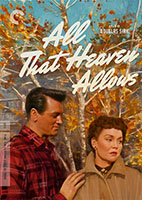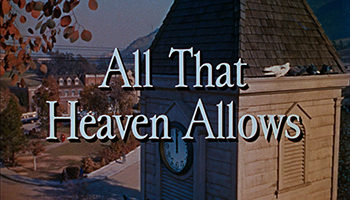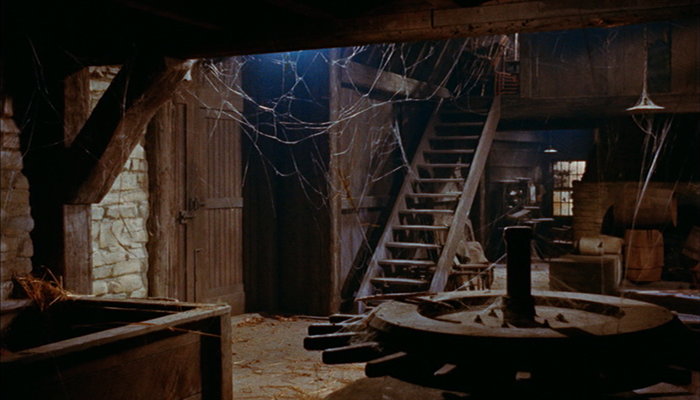2001: 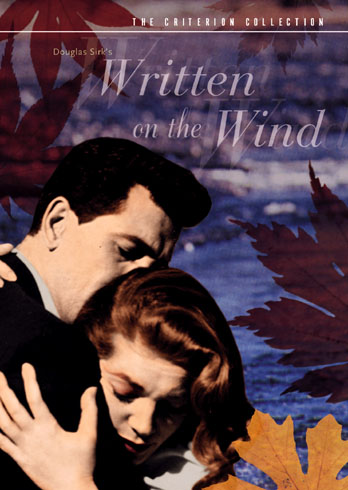
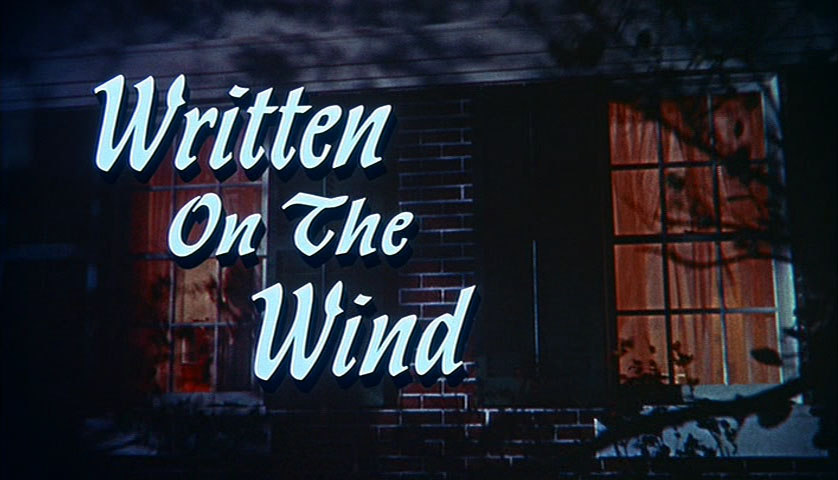
screenplay by George Zuckerman
based on the novel (1946) by Robert Wilder
directed by Douglas Sirk
Criterion #96.
And the category is: “Things You Can’t Write On.”
Or:
Yeah, the screenplay’s got some problems, but cut the guy some slack! He wrote it on the wind!
More samples upon request.
It’s commonly noted that this movie is a precursor to Dallas and Dynasty and the like. Someone on the Criterion site comments that more generally, Sirk here establishes the style and technique of TV drama as a whole. That’s well observed, and it gave me some retrospective purchase on All That Heaven Allows.
Sirk’s on-the-nose sense of drama is easy for me to dismiss because I’ve had so much practice dismissing it on TV. But beyond that easy dismissal, I do understand how this stuff is meant to be ingested: as something too homey to be critiqued, too basic to be shaken off. TV is just there, so your guard goes down. It makes you feel safely superior to it: that’s how it gets you.
But the more subconscious the effect, the more subjective the value. A recurring theme around here is that different art is “for” different psychologies. I was moved to devote time to writing about the Twilight Zone because it felt potent to me, which is to say relevant to my personal baggage; meanwhile I can’t imagine watching more than one curiosity-teaspoon’s-worth of Dallas or any other soap opera. (Admittedly I did take in a fair amount of secondhand All My Children once upon a time. And Adam Chandler is only one degree removed from Marylee Hadley. Which makes Stuart two degrees.)
What I’m saying is that it’s not my psychodrama; it doesn’t resemble my private gods. Sex and alcohol and money and oil and power all stand in for emotions, I get it, but I don’t feel it because none of that is in my symbology. All that King Lear stuff about dissolute heirs remains abstract to me. So far as I was engaged by this movie — and I was! — it was by the sheer ritual spectacle of melodrama, the crazy artifice, the shapes and patterns. And, yes, I suppose that makes it sound like it got in below my radar. That’s what I’m saying TV does: it teaches you shapes and patterns seemingly without real emotional weight or consequence, and thereby indoctrinates you to expect them in life. I’m sophisticate enough at this point to slot things into categories according to what prejudices they play to, but that doesn’t mean I’m not also being led around by my subconscious. The same way that reading Twitter makes you feel the general agitas even as you place yourself in opposition to it. It’s entirely possible that I’ll be seeing these characters in a dream some day. Who knows.
But speaking on behalf of my conscious mind: this is mondo schlock from planet schlocko and I felt pretty damn immune to its meanings.
It was perfectly watchable, though. Which is the TV-iest form of praise.
Lauren Bacall gives a distinct impression of discomfort. In fact I’m not sure she’s even doing the thing the word “acting” usually implies, wherein one attempts to convey emotions held by a fictional character. She seems rather to be giving a series of professional line readings, one after another, without making any effort to disguise her own personal feelings. Am I wrong? The screenplay tells us that she falls for Robert Stack, but it sure looks to me like she hates him. Apparently when Humphrey Bogart saw the finished movie he told her it was no good and that she should never do anything like it again. Maybe he was just nervous that she’d find out about his flirtation behind her back with Bookstore Girl.
Bookstore Girl acquits herself very well here. Dorothy Malone has the knack for extreme exaggeration that the genre requires; she’s completely at ease with her own flamboyance and simultaneously wry about it, which helps to absorb the audience’s insecurity. Once she enters the picture, about half an hour in, I suddenly found that I knew how to enjoy this campy soap opera after all. That alone is an achievement worthy of the Best Supporting Actress award. Which she won. (She died just this January at age 93. RIP!)
Robert Stack on the other hand just locks in his stare and goes as crazy as he can. Not as much for the audience to latch on to there but you can’t help but admire the shamelessness.
Rock Hudson as usual does an excellent job continuing to be Rock Hudson. He nails “what a nice man.” I think I liked him a little better here than in the previous one.
Harry Shannon as Rock Hudson’s father is excellent genetic casting. When they’re onscreen together you believe it.
When Sirk turns up his style to its fullest force — as when Dorothy Malone is dancing out her debauched soul while her father tumbles down the stairs — the impression, to me, is not just of bold exaggeration but of actually missing the mark. I imagine John Waters et al love this sort of thing because it combines sincere artistic conviction about pain and tragedy with honest-to-goodness aesthetic error. The juxtaposition fundamentally doesn’t work, and the bellyflop makes a spectacular splash. It’s stimulating to watch because it’s not apt, not insightful. The equation hasn’t been balanced.
Similarly those leaves that blow in the front door in the opening sequence, just to make sure you know what “wind” is. They’re like a pun that isn’t actually a pun. The hallmark of the style is fervent commitment to devices that are so hackneyed and obvious that they actually stop functioning.
Here are the lyrics to the title song:
A faithless lover’s kiss is written on the wind
A night of stolen bliss is written on the wind
Just like the dying leaves, our dreams we’ve calmly thrown away
Now they’ve flown away, softly flown awayThe promises we made are whispers in the breeze
They echo and they fade, just like our memories
Though you are gone from me, we never can really be apart
What’s written on the wind is written in my heart
Not only do these have approximately nothing to do with the action of the movie, but they also equivocate regarding what “written on the wind” means. Does it mean something that’s shallow bullshit, as in the first line? Or does it mean something that lives forever because it transcends the earthly, as in the last line? Maybe both? Let’s try both?
The only really important thing in this artistic universe is whether it’s delivered with passion. It doesn’t matter a bit to Sirk whether something is actually, as the trailer claims, “THE MOST REVEALING STUDY OF HUMAN EMOTIONS EVER ATTEMPTED ON THE SCREEN.” Clearly, in fact, it’s not, and he never thought it was. What matters to him is that it affects to be the most revealing study of human emotions ever attempted on the screen. He prizes that affectation and takes it very seriously indeed. And that seriousness in turn is entrancing in its guilelessness, as all true seriousness is.
Robert Stack says that after five weeks of marriage he’s “still up on cloud seven.”
Here’s another thing he says:
This line comes as the culmination of a subplot in which he wants desperately to attend the royal ball but he’s mocked by the king’s courtiers for being too clumsy, so he prays to the tree spirit, who provides him with a pair of magic dancing slippers, but the jealous forest witch hears his prayer and covets the slippers, and though he runs as fast as he can, she chases him all the way to the gate of the castle and just as he’s about to enter, snatches the slippers from his hand.
Actually the funny thing is that what the line really means is: he’s just a moment ago been informed by a doctor that it’s his probably his fault he and his wife haven’t been able to conceive: he might be sterile. Then when his wife asks him to dance he self-pityingly says that unfortunately someone just stole his, ahem, “magic dancing slippers.” That’s someone’s 1956 idea of a semi-entendre of some kind.
The sexual content definitely tries to push the boundaries of the moment, and sometimes the strain shows. The golden statuette of an oil derrick that Dorothy Malone fondles tragically in the final shots is a full-fledged double-entendre. Congratulations to everyone involved in working that one out; I know it can’t have been easy.
The score is again by Frank Skinner — again an able co-conspirator in reckless intensity — but the above-mentioned title song is by Victor Young, and it drives the ship. In fact I couldn’t find a suitable excerpt from the score that was all Skinner, so I’m just embracing it and giving you the finale and end credits, which is basically a straight-up orchestral arrangement of the song:
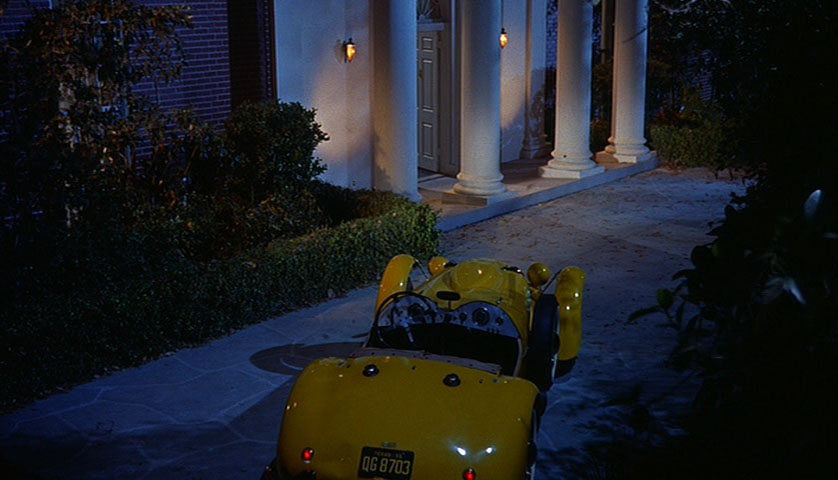
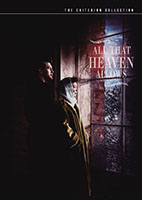 2014:
2014: 